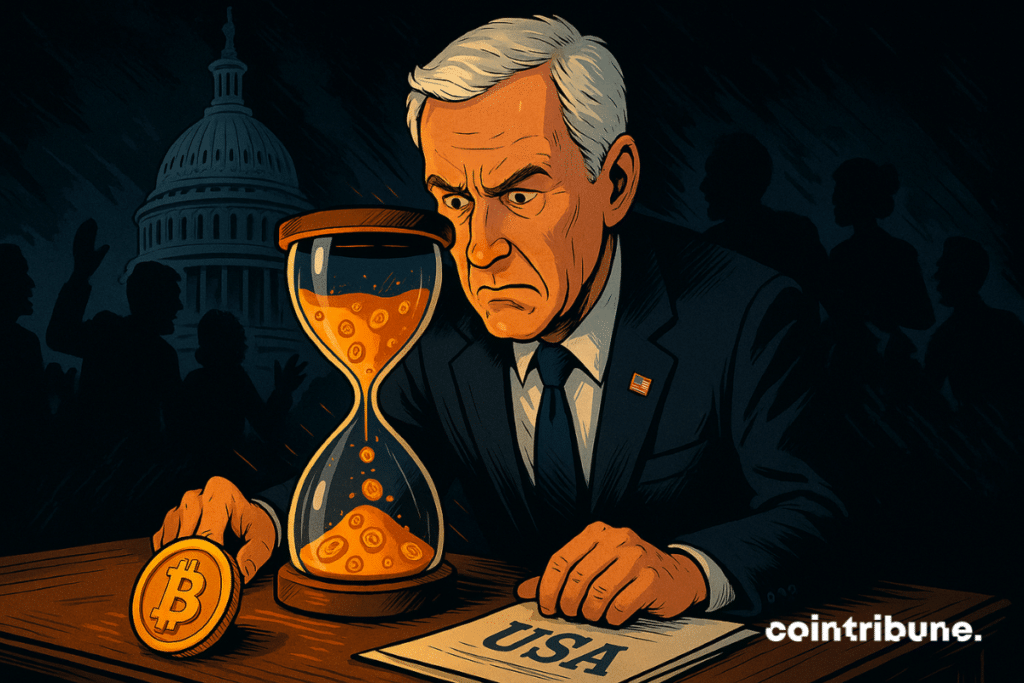Crypto Regulation: The US Congress Facing a Race Against Time
Time is running dangerously fast for the US Congress. As the federal government undergoes a historic shutdown, Republican Senator Thom Tillis issues an unequivocal warning: the window to pass crypto legislation will remain open only a few more weeks. After that, it will be too late. What makes this deadline so critical?

In Brief
- Republican Senator Thom Tillis believes Congress must act before February 2025 to adopt crypto regulation.
- The 2026 midterm elections risk paralyzing any legislative progress on digital assets.
- The government shutdown further complicates the situation, notably delaying SEC approvals for crypto ETFs.
- Several major bills, including the CLARITY Act passed by the House, are still awaiting Senate review.
Crypto Law, Race Against Time in the US Congress
Thom Tillis, Republican Senator from North Carolina and influential member of the Banking Committee, issues an unequivocal warning. Congress has at most a few months to advance crypto regulation.
“By the first part of January, February,” he specifies according to Bloomberg, emphasizing the urgency to act during the current session which will end in January 2027.
The political context seriously complicates matters. The government shutdown, which started in early October after the failure of budget negotiations between Republicans and Democrats, already blocks many files.
Mike Johnson, Speaker of the House, continues to delay parliamentary work. This administrative paralysis comes at the worst moment for the crypto sector, which hoped to see several major legislative texts finalized this year.
Tillis is particularly pessimistic about the chances of progress. “I am not optimistic about the possibility that we will advance further on anything around digital assets, stablecoins, or cryptocurrencies within this Congress“, he confides.
His analysis is based on an unavoidable political reality: the 2026 midterm elections will turn the legislative landscape into an electoral battlefield, making any consensus nearly impossible.
Major Projects Left Hanging
Several crucial legislative texts are waiting their turn in the Senate. The CLARITY Act, passed by the House of Representatives last July, was supposed to establish a clear regulatory framework for the crypto market structure. Senate leaders had promised to “build upon” this text to develop their own version. But time is running out and nothing is moving.
Republican Senator Cynthia Lummis, a leading figure on the crypto file within the banking committee, remains optimistic. She had stated before the shutdown that her version of the project, called the Responsible Financial Innovation Act, would become law by 2026. A bet that now seems increasingly risky amid political deadlock.
Despite the budget blockade paralyzing Washington for nearly a month, Senate Democrats are trying to maintain momentum.
A roundtable with leaders from Kraken, Coinbase, Ripple, and Circle is planned to restart discussions on the market structure. This initiative shows that, even in times of crisis, the crypto sector retains an important place in legislative priorities.
The shutdown is also slowing down the SEC’s decisions on crypto ETFs. The agency, operating with reduced staff, had to postpone the review of several files, including the Litecoin and HBAR ETFs from Canary Capital which nevertheless seemed close to approval.
A Strategic Appointment Hanging in the Balance
Amid this turmoil, one appointment is drawing attention. Donald Trump has designated Michael Selig to head the CFTC, one of the most influential financial regulators for the American crypto sector.
This Commodity Futures Trading Commission plays a major role in overseeing digital asset companies. However, Selig’s confirmation hearing did not appear on the Senate schedule last Monday, another illustration of accumulated delays.
The paradox is striking. While the Trump administration shows its support for the crypto sector and multiplies positive signals, Congress struggles to turn these intentions into concrete legislative texts. Companies in the sector remain in regulatory uncertainty, while investors turn to safe havens such as Bitcoin and gold.
In short, the window of opportunity is closing fast. If Congress fails to act by February, the American crypto industry will have to wait at least until 2027 to hope for the clear regulatory framework it has been demanding for years. A wait that could be costly in terms of competitiveness compared to more responsive jurisdictions.
Maximize your Cointribune experience with our "Read to Earn" program! For every article you read, earn points and access exclusive rewards. Sign up now and start earning benefits.
Passionné par le Bitcoin, j'aime explorer les méandres de la blockchain et des cryptos et je partage mes découvertes avec la communauté. Mon rêve est de vivre dans un monde où la vie privée et la liberté financière sont garanties pour tous, et je crois fermement que Bitcoin est l'outil qui peut rendre cela possible.
The views, thoughts, and opinions expressed in this article belong solely to the author, and should not be taken as investment advice. Do your own research before taking any investment decisions.